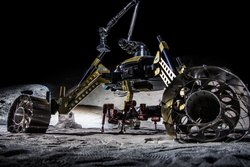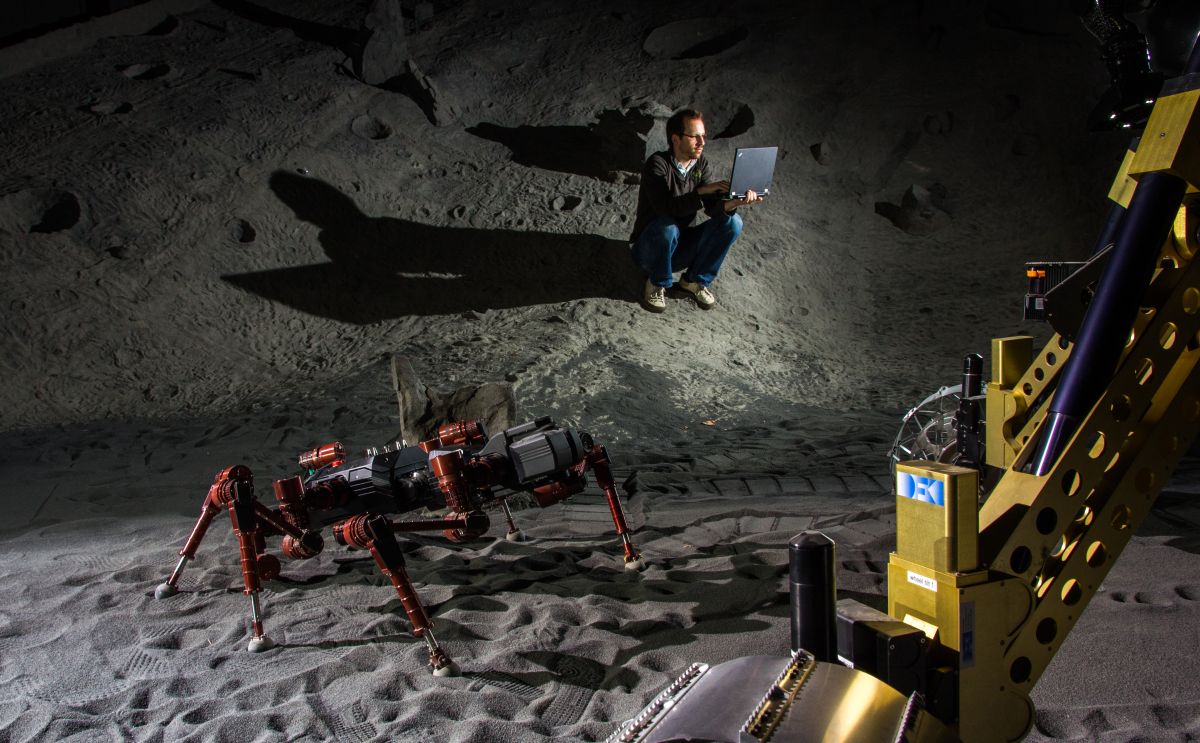RIMRES
Reconfigurable Integrated Multi Robot Exploration System

The aim of the project is the development of core technologies for modular, reconfigurable robotic systems to support the efficient and robust execution of complex tasks in uncooperative and difficult-to-access areas. Besides new methods for autonomy, navigation, and locomotion, the focus is on a highly modular system concept consisting of modules for different functions, i.e., locomotion, energy supply, data recording, autonomy, and navigation which are intended to be compatible with each other and will be linked via a uniform mechatronical interface.
| Duration: | 01.09.2009 till 31.12.2012 |
| Donee: | German Research Center for Artificial Intelligence GmbH |
| Sponsor: |
Federal Ministry of Economics and Technology
German Aerospace Center e.V. |
| Grant number: | Sponsored by the Space Agency (DLR Agentur), acting on a mandate from the Federal Government, grant no. 50RA0904. |
| Partner: | ZARM – Center of Applied Space Technology and Microgravity |
| Application Field: | Space Robotics |
| Related Projects: |
Lunares
Reconfigurable Robots for Extraterrestrial Exploration
(07.2007-
12.2009)
SCORPION
An Eight-Legged Robot for Hazardous Outdoor-Terrain
(01.2001-
12.2005)
SpaceClimber
A Semi-Autonomous Free-Climbing Robot for the Exploration of Crater Walls and Bottoms
(09.2006-
09.2009)
|
Project details
Robot Teams for Lunar Exploration
RIMRES (Reconfigurable Integrated Multi-Robot Exploration System) is a joint project of the DFKI Robotics Innovation Center and the ZARM (Center of Applied Space Technology and Microgravity).
Within this project, a complex demonstration scenario is set up demonstrating a lunar pole exploration. The focus lies on an improved surface mobility which is achieved by employing single robot systems with innovative morphologies and by combining heterogeneous robots into one overall system.
The hybrid wheeled-leg rover SHERPA developed in the RIMRES project offers not only a relatively energy-efficient locomotion in moderately unstructured terrain, but, as a result of the active suspension system, the rover provides increased mobility so as to free itself if getting stuck and to react flexibly to unforeseen circumstances.
The second mobile system in RIMRES is the six-legged walking Scout robot CREX for the exploration of the interior of lunar craters. It is transported by Sherpa to the crater rim, deployed, and starts climbing into the permanently shaded regions of the crater (see video at bottom of page). CREX is based on previous experiences gained in the SpaceClimber project.
Research activities also focus on the modularity of exploration systems: a uniform electromechanical interface serves to combine mobile systems either with each other, or with so-called payload items which, in turn, can also be combined among themselves. The payload items are used to assemble scientific and technological payloads or to enhance the capabilities of the mobile systems. This way, a task-specific reconfiguration of the systems beomes possible.
Videos
RIMRES: Sherpa and CREX

Sherpa is using its manipulator to deploy CREX. A possible use-case is the deployment off a landing unit at the beginning of an exploration mission
Sherpa: Stacking camera payload

CREX demonstrating its postural abilities. These are used for docking to Sherpa or in steep crater slopes
RIMRES: Manipulator

Observation of the docking process by using the manipulator's camera
RIMRES: Systems in a lunar exploration mission

The video shows a possible lunar exploration mission for the RIMRES-system.
Sherpa: Expandable rover for planetary applications

The video shows how Sherpa is embedded in the project RIMRES and gives first impressions on the locomotion capabilities of the system.




